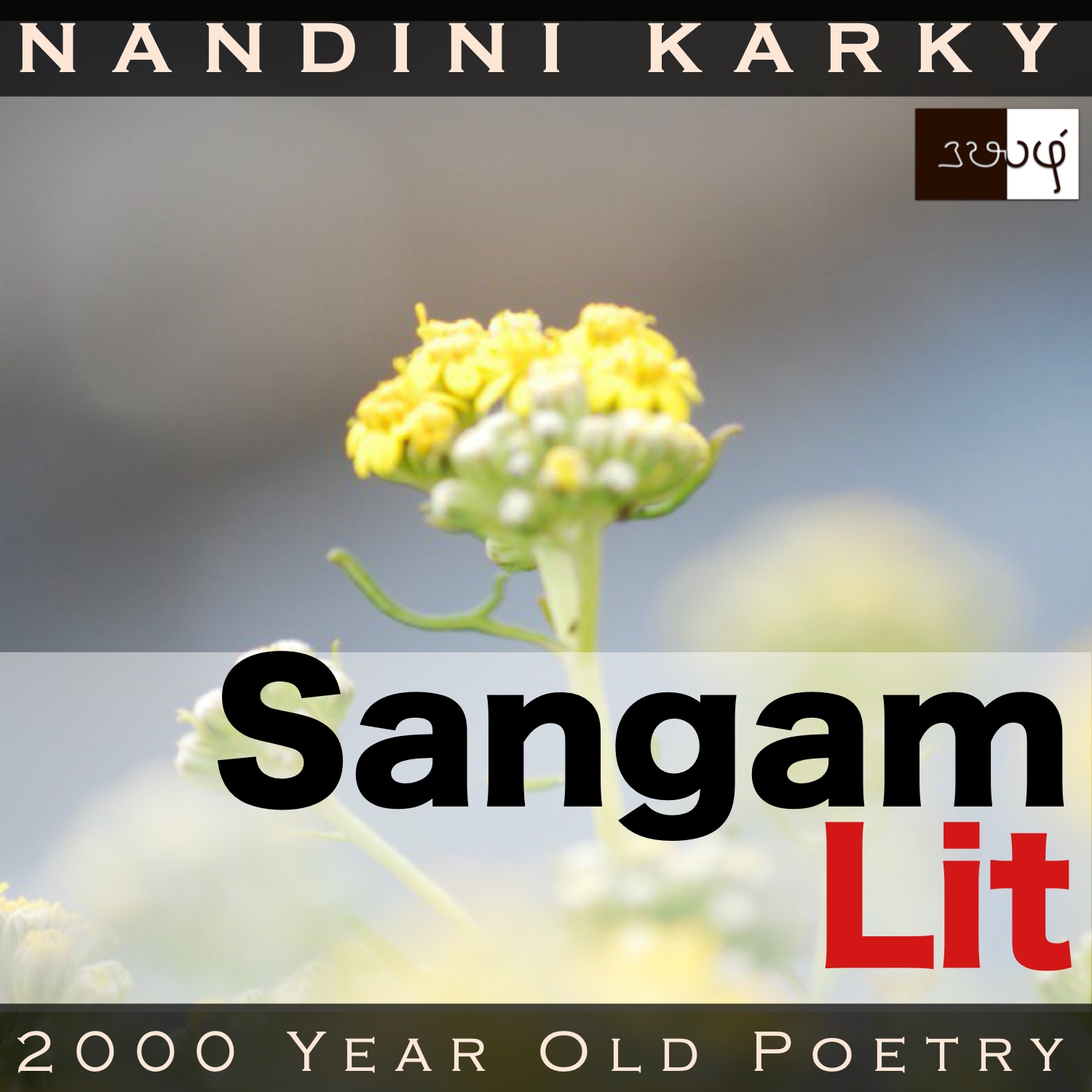Podcast: Play in new window | Download
Subscribe: Apple Podcasts | Spotify | Amazon Music | Android | iHeartRadio | TuneIn | RSS | More

In this episode, we perceive the battle between love and duty, as portrayed in Sangam Literary work, Natrinai 205, penned by Ilanakanaar. The verse is set in the drylands of ‘Paalai’ region and speaks in the voice of the confidante to the man, highlighting the consequences of the man’s decision to part away in search of wealth.
அருவி ஆர்க்கும் பெரு வரை அடுக்கத்து,
ஆளி நன் மான், வேட்டு எழு கோள் உகிர்ப்
பூம் பொறி உழுவை தொலைச்சிய, வைந் நுதி
ஏந்து வெண் கோட்டு, வயக் களிறு இழுக்கும்
துன் அருங் கானம் என்னாய், நீயே
குவளை உண்கண் இவள் ஈண்டு ஒழிய,
ஆள்வினைக்கு அகறிஆயின், இன்றொடு
போயின்றுகொல்லோ தானே-படப்பைக்
கொடு முள் ஈங்கை நெடு மா அம் தளிர்
நீர் மலி கதழ் பெயல் தலைஇய
ஆய் நிறம் புரையும் இவள் மாமைக் கவினே!
As the poem opens, we are greeted by the ‘roar of waterfalls’ in ‘அருவி ஆர்க்கும்’. Shortly thereafter, we glimpse at ‘ஆளி’, a ‘mythical creature which is said to have the trunk of an elephant and the body of a lion’. This creature is spoken in connection with ‘உழுவை’ or ‘tiger’ and ‘களிறு’ or ‘male elephant’. Stressing the theme of duty and separation, we meet with ‘ஆள்வினை’ which is ‘a man’s duty of earning wealth’. The poem ends by turning the focus on aspects of femininity in ‘exquisite hue’ or ‘ஆய் நிறம்’ and ‘மாமைக் கவின்’ or ‘dark-skinned beauty’. Let’s dive deeper to sense the substance in the verse!
The man and lady were leading a happy married life when the man felt himself urged by the need to seek wealth for their family and thereby, part with the lady. Knowing of his intention, the lady’s confidante says to him, “In the slopes of the tall mountain ranges, resounding with the roar of cascades, ‘aali’, a fine animal, is out on a hunt, roaming with its sharp claws ready to kill. Seeing the powerful male elephant, one with white tusks curving to a sharp point, felled by a striped tiger, the ‘aali’ drags the tusker’s huge form to its den. Not considering that you must traverse a forest filled with such scary scenes, you intend to fulfil your manly responsibility of earning wealth, leaving behind your lady with eyes like blue lilies. Your lady’s skin is akin to the extending, beautiful leaves of the ‘eengai’ tree with curvy thorns in the garden, when it has been drenched by the fall of heavy rains. Do consider that the moment you part away, the beautiful hue of your lady’s dusky beauty will vanish!” With these words, the confidante dissuades the man from his intention to seek wealth, owing to the suffering that will come the lady’s way, if the man parts away.
Now, for the details that decorate this tale! The confidante opens her arguments by illustrating a probable scene from the forest that that the man will have to cross, if he decides to pursue his intention of seeking wealth. In this forest on the mountain slopes, where the din of the falling cascades can be heard, roams a fierce and powerful ‘aali’. This creature sighting a struggling elephant that has been felled by a striped tiger drags the pachyderm to its den to decimate the animal. After mentioning this frightening scene to give a taste of the man’s journey, the confidante talks about the lady’s position, if the man decides to leave. She remarks that the skin of the lady that shines with a freshness akin to the rain-washed shoots of an acacia bush, will lose the glow of its beauty, if the man parts away.
Rewinding to the description of the ‘aali’, we learn that this is a mythical creature, portrayed in many temples as the guardian spirit, and seems to be a fusion of powerful animals like the lion and elephant. This mythical creature is mentioned by the confidante as a metaphor for the disease of pining that will strike the lady, broken by the man’s parting, and fell her down, akin to that struggling elephant that has been attacked by the tiger. The norm of a man seeking wealth is inherently understood and at the same time, the effect this will have on the lady is brought out here. Why is femininity presented as something characterised by so much fragility? Why is it repeatedly in these ancient verses, the woman is presented as someone so weak, that she cannot bear the separation of a man? Is it to delight the male patrons, who shower these poets with wealth or is it a true reflection of Sangam society? With these unanswered questions guiding us, let’s move forward in our path of exploration!




Share your thoughts...